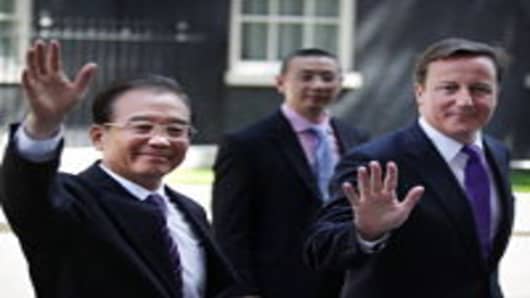Will China be Europe’s white knight? The head of the European Financial Stability Facility (EFSF), Klaus Regling, certainly hopes so. He made China his first fundraising stop for the Eurozone’s newly unveiled plan to raise $1.4 trillion to bolster weakened economies. French President Nicolas Sarkozy called China’s President Hu Jintao beseeching him to dole the fund a portion of its $3.2 trillion of reserves.
Even if Europe bows to Chinese pressure to designate it a market economy and promises other major concessions like ending an arms embargo, the reality is China will be cautious in adding money to any bail out fund . While Chinese Premier Wen Jiabao announced the nation will be a friend to Europe, he has spoken mostly in vague terms.
There is a rising domestic chorus that the fund is not a silver bullet that will bail out Europe and solve the world’s economic problems.
Last month conventional wisdom said if China buys Italians bonds, that would be enough. This month’s flavor is that China’s investment in the stability fund will solve all of Europe’s problems.
What about next month when concerns about Italy come to head - after allItaly had to pay an unsustainable 6 percent on 10-year notes on Friday October 28the day after the plan was announced showing investor concern still remains – or if demonstrations in Greece turn more violent as unemployment surges.
Far too many politicians have been looking for easy solutions like forcing investors to take a small cut on Greek bonds or lowering interest rates – the reality is the continent’s problems will take years if not decades to work out because of addiction to overspending and a web of social benefits that sap business productivity, hurt entrepreneurship and saddling future generations with debt.
The Chinese government is also limited in how much firepower it really has to help even if it wanted to despite its cash horde. Inflation there topped 6.1 percent last month. Real estate prices are softening and fears of non-performing loans and slowing exports are rising. China is poised for a soft landing but the government needs its reserves for what could be a fast approaching rainy day.
Many in China argue the country should spend more on China’s poor and be more cautious on outbound investments. After all the purchasing power of the Greeks according to the International Monetary Fund was four times that of the Chinese in 2010. Why should China, a relatively poor country, bail out wealthier nations?
However, as the world’s healthiest superpower China needs to play a responsible role. A far more likely scenario than buying lots of bonds or injecting money into a fund over which it has little control is the government and state-owned enterprises buying up assets like machinery and ports that will help China.
China is already stepping up its purchases in Europe, such as the state-owned China Eastern Airlines buying Airbusplanes last month. China also imports more, mainly machinery, from Germany than it exports to that country. Expect more purchases of European products and assets which will provide an immediate benefit to China’s economy and actually help Europe more than buying bonds.
The best thing China can do for the world’s economy is to continue to buy actual products from Europe and be cautious in doling out money too ill conceived plans. Buying products will help the region restructure economies and provide employment which is the key to any recovery. Until Europe’s politicians can prove to China that they have got their act together with detailed plans, China should not add much money into the fund.
Shaun Rein is the founder and managing director of the China Market Research Group (www.cmrconsulting.com.cn) a strategic market intelligence firm, and is based in Shanghai.
He is the author of the upcoming book “The End of Cheap China: Economic and Cultural Trends that will Disrupt the World” published by John Wiley & Sons in the U.S. He does not own shares in any company mentioned. Follow him on Twitter at @shaunrein.


